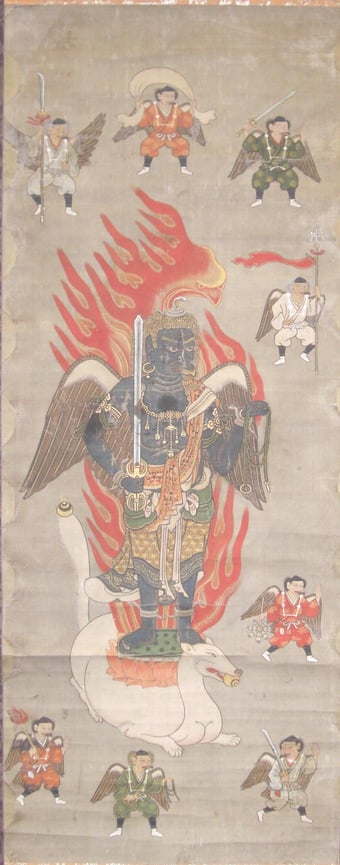
The Hero of Mount Iizuna
Iizuna Saburo
Tengu
What is Iizuna Saburo Tengu?


・
Nagano
Mt. Iizuna
Iizuna Saburo Tengu is a Tengu, a mythical creature with the form of a bird, transmitted through the traditions of Iizuna Mountain. Iizuna Mountain, located in the northern part of Nagano Prefecture, has been revered as a sacred mountain, gaining devotion over the ages. Over time, the deity of the mountain came to be known by different names such as "Iizuna Gongen," "Iizuna Myojin," and "Iizuna Saburo Tengu." In contrast to the typical "long-nosed" Tengu, Iizuna Saburo Tengu is often referred to as the "bird-shaped Tengu."
How does he look?

According to the oldest records, this mystical entity is said to possess the following characteristics:
- The face of a raptor (such as a hawk or eagle)
- The body of a child
- Wings growing from the armpits
- Holding a sword and rope
- Riding on a fox and soaring through the sky
Saburo Tengu of Mount Iizuna
Please watch the video with English subtitles.

Explore Iizuna Saburo Tengu Further
Legend of Iizuna Saburo Tengu:
During the Asuka period (around the 6th century) when Buddhism was introduced to Japan, ten princes born in India, the birthplace of Buddhism, decided to become deities and save the people of Japan. The third prince chose Iizuna Mountain as his dwelling and established thirteen vows for the well-being of the people. Through these vows, the prince transformed into the figure of Saburo Tengu, continuously watching over the people living at the foot of Iizuna Mountain.
Nationwide Fame of Saburo Tengu:
The Iizuna faith spread through the yamabushi who practiced on Iizuna Mountain, and shrines dedicated to Saburo Tengu can be found nationwide. Examples include Yakuo-in on Mount Takao in Tokyo, Hanjo-ji in Isumi City, Chiba Prefecture, and Fukuryo-ji in Koga City, Shiga Prefecture, known for its expertise in ninjutsu. Additionally, Saburo Tengu has left a significant presence in Japan's history and culture, serving as a motif in Noh and Kabuki performances.

Iizuna Mountain and Shugendo:
Shugendo is a practice of intense ascetic training in the mountains, aiming to attain mystical powers and save oneself and others. The nearby Togakushi Mountain was also known for Shugendo, and many ascetics, called "yamabushi," practiced on Iizuna Mountain. Observing the yamabushi dedicating themselves to rigorous training, the local residents were astonished by their seemingly miraculous powers, perhaps associating them with Tengu.

Saburo Tengu Adored by Leaders in the Warring States Period:
Saburo Tengu, also considered a god of war, was revered by many feudal lords during the Warring States period, such as Uesugi Kenshin and Takeda Shingen. A technique called "Magic Iinawa no Nori" was diligently practiced. Particularly, Uesugi Kenshin showed deep faith by attaching a golden statue of Saburo Tengu to his cherished helmet.


Saburo Tengu among Japan's Eight Great Tengu:
Alongside attractions like Atagoyama Taro-bo in Kyoto, Iizuna Saburo Tengu is regarded as one of the "Eight Great Tengu" possessing strong spiritual power. Moreover, the "Tengu Sutra" written in the mid-Edo period introduces Saburo Tengu as one of the forty-eight Tengu.

Tengu's Barley Rice:
There is a legend that Saburo Tengu transformed the soil of Iizuna Mountain into edible soil during times of famine, distributing it to many people. This soil became known as Tengu's Barley Rice, and it is said to be the origin of the name "Iizuna," meaning a mountain where "rice-like sand (Ii, referring to rice) can be obtained from the soil (Suna)."
Iizuna Saburo Tengu Taiko Music
Envisioning Iizuna Saburo Tengu calmly watching over the people of the village
from the sky.
Iizuna Saburo Tengu, also known as the God of Battle and respected by Sengoku warriors, is envisioned in a gallant and fierce fighting spirit.
Please watch the video with English subtitles.
Iizuna Saburo Tengu: Diverse Statue Expressions
Wooden Iizuna Gongen Statue (Togakushi Shrine):
Located at Togakushi Shrine in Nagano City, this statue, created around the 18th century, features a distinctive dark-blue body with wings. Notably, a white fox is depicted treading on rice straw, symbolizing the deity's association with grain and agriculture.

Iizuna Gongen Statue Diagram :
A hanging scroll believed to date back to the Edo period, it depicts Iizuna Gongen in the center surrounded by eight smaller Tengu figures, showcasing a unique and vivid representation.
(Preserved at Iizuna Historical Interaction Hall)

Iizuna Myojin Statue (Illustration at Takaoka Shrine):
The divine object at Takaoka Shrine in Iizuna Town, Nagano, is dated back to Kan'ei 18 (1641). It is considered the second oldest among the dated statues, displaying intricate craftsmanship.

(This is an excerpt from "まんが飯綱今昔物語")
These statues exemplify the rich cultural and religious significance of Iizuna Saburo Tengu, illustrating the unique artistic expressions and beliefs associated with this mythical being.
Reference:
"Iizuna Faith - Fluttering Iizuna Saburo Tengu"
(飯綱信仰ー羽ばたく飯綱三郎天狗)
by Iizuna Historical Interaction Hall
(いいづな歴史ふれあい館)
This website was created through the utilization of the 長野県地域発元気づくり支援金, supported by the Iizuna Gongen Taiko.
Iizuna Gongen Daiko
E-mail: iizunagongendaiko@gmail.com
